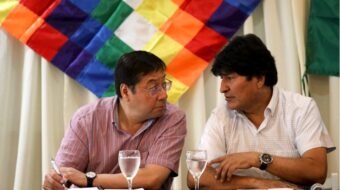Declares no “top secret” info gathered, but upholds convictions
In the complicated case of five Cuban men arrested on various charges of conspiracy almost 10 years ago, an appeals court upheld their convictions June 4, while rescinding some of their harsh sentences.
A three-judge panel of the 11th Circuit Court of Appeals annulled life sentences for Antonio Guerrero and Ramon Labinino on grounds that no “top secret information was gathered or transmitted.”
They also threw out the 19-year sentence against Fernando Gonzalez because of his subordinate role in gathering information on Florida-based right-wing paramilitary groups. The groups were notorious for mounting terrorist assaults against Cuba.
However, the court’s decision to uphold the guilty verdicts shows another agenda is at work, according to defense attorneys.
“It is very clear to us attorneys that there is an ideological prejudice in the writing,” attorney Leonard Weinglass said on Cuban television last week, analyzing the June 4 ruling. “The U.S. government is using the justice system to achieve a foreign policy objective,” he said.
Gerardo Hernandez, Fernando González, René González, Ramon Labanino and Antonio Guerrero, also known as the Cuban Five, had monitored violent Florida-based groups in order to protect lives and property from assault. Attacks on Cuba from these groups have been planned and executed with impunity over many decades.
Noting that not all the Cuban men got their sentences changed, Weinglass condemned the court’s failure to modify René González’s 15-year sentence and its dismissal of pleas to remove Hernandez’s two life sentences.
In a statement lauding Judge Phyllis Kravich’s dissent, the National Lawyer’s Guild said the government had failed “to prove beyond a reasonable doubt that Hernandez agreed to participate in a conspiracy to shoot down planes.” This is a reference to the murder conspiracy charge against Hernandez stemming from the deaths of four Miami pilots whose planes were attacked by Cuban jets after flying into Cuban airspace in 1996.
Weinglass noted earlier that in Hernandez’s case, the legal argument to reduce his sentence is clear: even though he was charged only with conspiracy, his sentence was the same as for a more severe charge, espionage.
Judge William Pryor wrote the appeals court opinion. His appointment to the appeals bench was originally rejected by the Senate. President Bush then used a temporary recess appointment to install the right-wing judge, and Sen. John McCain engineered Pryor’s final Senate approval in 2005.
In 2005, another appeals court panel accepted defense arguments that prejudice in Miami had invalidated the original convictions. But that ruling was rejected a year later by the full court. This time, the court ruled on remaining questions: insufficient evidence for conspiracy, “sovereign immunity,” skewed sentencing, and several matters relating to due process.
Attorneys for the Cuban Five will ask the three judges on June 24 to reconsider their decision based on errors noted by the lawyers, possibly asking for a full court review. Appeal to the Supreme Court is likely, according to Weinglass. Acceptance of the case would permit review of all defense arguments including venue prejudice, alleged secret arrangements between trial judge and the prosecution, and evidence withheld favoring the defense.
The National Lawyers Guild statement noted, “During the original trial, the Bush administration paid journalists to write unfavorable stories about Cuba. Anti-Cuban extremists tried to intimidate the jurors, and even prospective jurors admitted that they would be afraid to return not-guilty verdicts against the Five.”
In the wake of the appeals court decision, protests have taken place in the United States, Canada, Latin America and Europe. The International Committee for the Freedom of the Five declared, “We are not surprised by the judicial ruling. On the contrary, it reaffirms our need to continue fighting tirelessly to denounce this colossal injustice.”
In a statement, Jitendra Sharma, president of the International Association of Defense Lawyers, called upon “all of its members and others in the legal community to condemn the decision and to take actions seeking the release of these five men.”
Upon hearing the decision, prisoner Gerardo Hernandez promised to “endure as many years as necessary, 30, 40, whatever it takes. As long as one of you is resisting, we will also resist until there is justice.”
From prison in Florida, René González denounced lies and crimes “against the people of Cuba.” He extended “our expressions of optimism, assurances as to our integrity and our sentiments of infinite love” as the “only worthy reply to this meanness.”
atwhit@roadrunner.com









